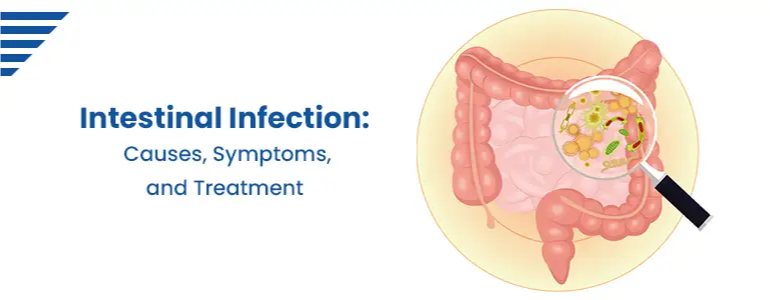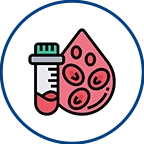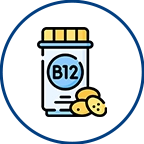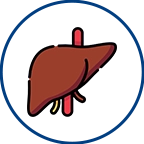Intestinal Infection - Causes, Symptoms, and Treatment

Intestinal or gastrointestinal infections can disrupt daily life and lead to uncomfortable symptoms. These infections affect the digestive system and can result from various causes, including bacteria, viruses, and parasites. This blog will explore the common causes, symptoms, and treatment options for intestinal infections to help you better understand this condition and how to manage it.
Causes of Intestinal Infections:
Bacterial Infections: Bacteria like Salmonella, Escherichia coli (E. coli), and Campylobacter are common culprits of intestinal infections. These infections often result from consuming contaminated food or water.
Viral Infections: Intestinal infections can be brought on by viruses like rotavirus and norovirus. These highly contagious infections can spread through direct contact or contaminated surfaces.
Parasitic Infections: Ingesting parasites like Giardia and Cryptosporidium through contaminated food or water can result in intestinal illnesses.
Food Poisoning: Consuming contaminated or spoiled food can lead to gastrointestinal symptoms, often called food poisoning. Bacteria like Staphylococcus and Clostridium perfringens are common culprits.
Home Sample Collection
Symptoms of Intestinal Infections:
Common symptoms of intestinal infections include:
Diarrhoea, which may be watery or bloody
Abdominal cramps and pain
Nausea and vomiting
Fever
Fatigue
Loss of appetite
Dehydration, especially in severe cases
Treatment of Intestinal Infections:
Hydration: Staying well-hydrated is crucial to prevent dehydration from diarrhoea and vomiting. Drink clear fluids, oral rehydration solutions, and electrolyte-rich beverages.
Rest: Rest allows your body to recover and heal from the infection.
Dietary Adjustments: Avoid spicy, fatty, or irritating foods that can exacerbate symptoms. Choose bland, simple meals like rice, bread, and bananas that are simple to digest.
Medications: Sometimes, healthcare providers prescribe medications to manage specific symptoms or address the underlying cause. Antibiotics are sometimes necessary for bacterial infections.
Preventive Measures: Intestinal infections can be prevented through proper hand washing, food safety procedures, and avoiding contact with infected people.
When to Seek Medical Attention:
While many intestinal infections resolve on their own with home care, it's essential to seek medical attention if you experience:
Severe dehydration
High fever
Blood in stool
Prolonged symptoms lasting more than a few days
Signs of a more severe infection, such as persistent vomiting or altered mental status
Conclusion:
Intestinal infections can disrupt daily life and lead to uncomfortable symptoms, but most cases can be managed effectively with proper care and treatment. Understanding the common causes, recognizing signs, and practising preventive measures are essential to managing and preventing intestinal infections. If you suspect a severe illness or experience persistent symptoms, consult a healthcare provider for a correct diagnosis and a treatment plan customized to your requirements. Speak with a healthcare professional.
Frequently Asked Questions
1. What are intestinal infections, and how do they differ from food poisoning?
Intestinal infections are illnesses caused by various pathogens (bacteria, viruses, parasites) that affect the gastrointestinal system. Food poisoning is an intestinal infection caused by consuming contaminated or spoiled food.
2. How do I know if I have an intestinal infection?
Common symptoms of intestinal infections include diarrhoea, abdominal pain, nausea, vomiting, fever, and fatigue. It may be an intestinal infection if you experience these symptoms, especially after consuming questionable food or water.
3. Are intestinal infections contagious?
Yes, some intestinal diseases, especially those caused by viruses like norovirus, can be highly infectious. Practising good hand hygiene is essential to prevent the spread of these infections.
4. What are the most common causes of bacterial intestinal infections?
Common bacterial causes of intestinal infections include Salmonella, E. coli, Campylobacter, and Shigella. These bacteria often result from consuming contaminated food or water.
5. How can I prevent intestinal infections?
Preventive measures include washing hands thoroughly before eating or preparing food, following food safety practices, avoiding consumption of undercooked or raw foods, and practising good hygiene, especially in crowded or public places.
6. When should I seek medical attention for an intestinal infection?
You should consult a healthcare provider if you experience severe dehydration, high fever, blood in your stool, prolonged symptoms lasting more than a few days, or signs of a more severe infection, such as persistent vomiting or confusion.
7. Can antibiotics treat all types of intestinal infections?
Antibiotics are effective against bacterial infections but are not helpful for viral or parasitic infections. Based on the disease's underlying cause, your healthcare expert will decide on the best course of action.
8. Is it safe to continue eating during an intestinal infection, or should I fast?
Eating during an intestinal infection is essential, but choosing bland, easily digestible foods like rice, toast, and bananas is crucial. These foods can help provide necessary nutrients without further irritating the digestive system.
9. Can I get reinfected with the same intestinal infection after recovering from it once?
Getting reinfected with some intestinal disorders is possible, especially if exposed to the same pathogen. Food safety procedures and good cleanliness can lessen the danger of reinfection.
10. Are there any long-term complications associated with intestinal infections?
In some cases, intestinal infections can lead to complications such as persistent diarrhoea, irritable bowel syndrome (IBS), or reactive arthritis. However, only some cases are resolved without long-term issues with appropriate treatment and care.
Book Your Slot
Our Locations Near You in Hyderabad
3KM from Banjara Hills
1.9KM from Yusufguda
3KM from Madhura Nagar
5KM from Shaikpet
Profiles
- Cardiac Risk Profile
- Pituitary marker Profile
- Rheumatoid Arthritis Profile
- Dengue Fever Panel
- Lung Cancer Panel 1 Complete Molecular
- Gastroenteritis Screening Panel
- Thyroid Profile (T3,T4,TSH), Serum
- Pancreatic Marker Profile
- STD profile
- Androgen Profile
- Lipid Profile, Serum
- Pancreatic(acute)Profile
- PCOD Profile
Radiology
Pathology Tests
- Glucose Fasting (FBS),Sodium Fluoride Plasma
- Creatinine, Serum
- Glycosylated Hemoglobin (HbA1C)
- Vitamin B12 (Cyanocobalamin), Serum
- Thyroid Stimulating Hormone (TSH) Ultrasensitive, Serum
- Complete Urine Examination (CUE), Urine
- Liver Function Test (LFT),Serum
- Dengue (IgG & IgM), Serum
- Dengue Antigen (Ns1) Rapid, Serum
- C-Reactive Protein (CRP), Serum
- Widal (Slide Method), Serum
- Total IgE, Serum




